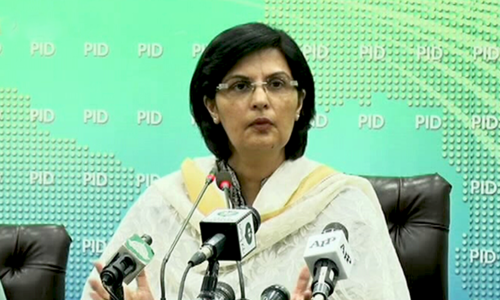ISLAMABAD: The Economic Coordination Committee (ECC) of the Cabinet on Wednesday approved the launch of second phase of the Ehsaas Emergency Cash Programme (EECP) worth Rs48 billion, under which Rs12,000 would be provided to each of the four million additional beneficiaries.
The meeting of the ECC virtually presided over by Minister for Finance and Revenue Shaukat Tarin also approved issuance of a series of notifications for the implementation of the Pakistan Single Window for imports and exports and constituted a committee to suggest how to ensure payment of net hydel profit to provinces, including an upfront payment of Rs87bn, without burdening the federal budget.
The EECP’s second phase envisages increasing the number of regular Ehsaas Kafalat beneficiaries to 8m by June through the ongoing National Socio-Economic Registry Survey (NSER). All these beneficiaries will be provided a six-monthly tranche (January-June, 2021) of Rs12,000 per beneficiary under Ehsaas Kafalat.
These 4m additional beneficiaries will be identified through the ongoing NSER by using higher eligibility threshold while remaining below the poverty line. These beneficiaries will also be provided one-time emergency cash assistance of Rs12,000 per head to compensate for unemployment caused by Covid-19. The disbursement process will be initiated within this financial year.
The meeting was informed that EECP was launched in April last year to mitigate the effects of coronavirus lockdown on the most vulnerable segments and the identification and disbursement to eligible beneficiaries was assigned to the Benazir Income Support Programme (BISP).
The BISP identified around 17m eligible families under five categories, including regular beneficiaries of Ehsaas Kafalat. The disbursement began in April and was completed in September last year with the distribution of Rs179bn among 14.8m beneficiaries.
The second phase of the programme has been taken in hand as hardship increased following the start of the third wave of Covid-19 a couple of months ago. The main features of the second phase include increasing the number of regular Ehsaas Kafalat beneficiaries to 8m by next month through the ongoing NSER, as per eligibility criteria as approved by the BISP Board.
The cash assistance will be provided through existing partner banks of BISP, including Bank Alfalah in Khyber Pakhtunkhwa, Azad Jammu and Kashmir, and Gilgit-Baltistan, and Habib Bank Limited in Punjab, Balochistan and Sindh through biometrically enabled ATMs and retail Points of Sale (POS) agents, as well as through dedicated bank branches for beneficiaries with thumb amputations or other biometric failures.
The current network of these two banks will be expanded for the purpose of this payment and special arrangements will also be put in place to ensure safe delivery of cash. It was noted that BISP had sufficient budgetary support for disbursement to regular Ehsaas Kafalat beneficiaries but Rs48bn was required for disbursement of one-time emergency cash assistance to 4 million additional beneficiaries.
The meeting was also told that BISP had disbursed about Rs12bn to beneficiaries under 18 phase of EECP from its own budget during current fiscal year while another Rs10bn saving would be available from current year’s spending. This Rs12bn would be provided by ministry of finance from its budget.
The cumulative Rs22bn would cover payments to 1.8m of the 4m additional beneficiaries. The additional Rs26.4bn required to cover payments to remaining 2.2m beneficiaries would be provided through next year’s budget.
On a summary moved by Ministry of Energy (Power Division) for the payment of Rs87bn balance amount of Net Hydel Profits (NHPs) to Wapda for payments to provinces, the ECC decided to constitute a committee with members from Power Division, Wapda and Finance Division to suggest a mechanism for payment of NHPs “in a timely manner without pressurising” the national exchequer.
The meeting was informed that as part of Wapda’s generation tariff, power regulator is allowing NHP in Wapda’s power sale billing. This year the central power purchasing agency (CPPA) has released Rs46bn to Wapda on account of total billing while Wapda has paid Rs12bn of NHP to KP and Rs1.5bn to Punjab.
At the start of March this year, Wapda owed Rs41bn to KP and Rs53.2bn to Punjab. The ECC was informed that at a recent meeting of the National Assembly, it was decided that KP’s payables be cleared by the federal government. The problem is that this decision puts an additional burden on the federal budget.
Wadpa has contended that it had acquired over Rs105bn loan from the market to make advance NHP payments to the two provinces but this had an additional financing cost of about Rs12bn which the Nepra did not allow in its tariff for recovery from consumers.
It said that any additional loan would meet the same fate and the federal government would have to provide subsidy to service the loan and would also affect its balance sheet and hamper required financing for upcoming mega projects. The outstanding NHP payable by June 30, 2021 was estimated at Rs87bn.
The ECC meeting also approved a total of eight supplementary grants worth about Rs7bn, including Rs3.91bn for defence division to meet a shortfall in operational expenses at the Pakistan Navy Headquarters. Other such grants included Rs700m for aviation division, Rs288.89m for cabinet division for repair and purchase of six aviation squadrons, Rs125m for ministry of federal education, Rs819m for Special Communication Organisation, Rs400m for raising a special security wing for Kartarpur Corridor, Rs43m for Pakistan Institute of Development Economics for pension payments and Rs807m for pension payments of Pakistan Agricultural Research Council.
Published in Dawn, May 27th, 2021














































